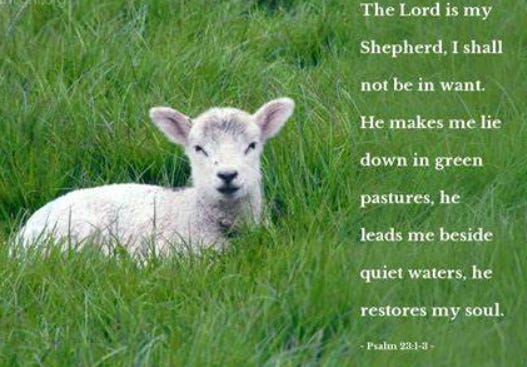Picture credit: https://revpacman.com/2024/04/21/the-lord-is-my-shepherd/
“The Lord is my shepherd, I lack nothing.”
Ps 23: 1
David boldly declared that God is Lord—the timeless God who was, who is, and who is to come; the Creator God; and the saving God. In his very next breath, David referred to God as a shepherd, a title he can confidently use based on his personal experience.
When he was a young boy, before he became the king of Israel, he spent his time in the fields tending to his family’s sheep. He understood what it meant to be a shepherd. He was familiar with the long hours spent outdoors in all kinds of weather, the dangers posed by wild animals and thieves, the loneliness of the job, and the miles he had to travel to find new pastures.
David understood that sheep often strayed and wandered away from the rest of the flock. In their pursuit of fresh grass, they would lower their heads, concentrate on the lushness of their meal, and lose track of where the other sheep were, ultimately getting lost. He had the experience of being a shepherd.
He also understood that God is often referred to as a shepherd. In Genesis, chapter 49, when Jacob was on his deathbed, he told his sons that God was “the Shepherd, the Rock of Israel.” (Gen 49: 24, NIV)
Later, during Solomon’s reign, David’s son, Asaph, wrote Psalm 80, which begins with the sentence, “Hear us, Shepherd of Israel, you who lead Joseph like a flock” (Psalm 80: 1, NIV). Yes, God is described as a shepherd.
When David wrote Psalm 23, he used the Hebrew word “raa,” which means shepherd. Interestingly, this word is often used in the context of feeding or to feed. It’s worth noting that the prophet Jeremiah used “raa" eight times to refer to a pastor. Just as shepherds guide their flock, pastors serve as shepherds by feeding their congregation with the Word of God and guiding them in the truth.
In the previous post, we discussed how God is the Lord who created everything, including us. We also see that God desires a daily relationship with us. He guides us, shows us where to find rest, provides protection, and nourishes us.
For the past 26 years, I have not had a traditional career. Instead, I have worked as a contractor, which is inherently more unstable. I can be let go when projects end, often without much notice—sometimes just a week. My role is tied to peaks in demand, and once those peaks are over, my employment may end. This lifestyle definitely feels more precarious than having a full-time job.
However, I have witnessed God’s intervention in my work life, providing opportunities and sustaining my family. At times, I find it challenging to recognize His involvement in our daily lives, especially in our modern world, where we have full fridges and may take our provisions for granted.
It’s easier for us to recognize God’s call to action when we see a homeless person in the street who needs food. Certainly, God does not want anyone to go hungry when we have the means to help. We can also see God’s presence as a shepherd in the example of George Müller, whose homes were filled with children and who received food parcels just before breakfast from generous donors. Additionally, it’s much easier to perceive God’s protective hand when riding a motorbike than when safely seated in a car.
We often witness the persecution of Christians and may wonder about God’s protection in these situations, which is a valid concern. However, God has never promised us physical protection. In fact, Jesus told His disciples that He would be put to death and that if they chose to follow Him, they would endure similar treatment. Jesus instructed us to resist the devil, and he would flee from us; however, physical suffering is an inherent part of the Christian experience. While the spiritual battle has already been won, we must acknowledge that we will face suffering during our time on earth.
Lastly, in the Old Testament, God made a point of telling the Israelites that their shepherding was bad because they weren’t looking after their friends, family, and neighbours, “The word of the Lord came to me: “Son of man, prophesy against the shepherds of Israel; prophesy and say to them: ‘This is what the Sovereign Lord says: Woe to you shepherds of Israel who only take care of yourselves! Should not shepherds take care of the flock? You eat the curds, clothe yourselves with the wool and slaughter the choice animals, but you do not take care of the flock. You have not strengthened the weak or healed the sick or bound up the injured. You have not brought back the strays or searched for the lost. You have ruled them harshly and brutally. So they were scattered because there was no shepherd, and when they were scattered they became food for all the wild animals. My sheep wandered over all the mountains and on every high hill. They were scattered over the whole earth, and no one searched or looked for them.” (Ezek 34: 1-6, NIV) In contrast, Jesus Christ referred to himself as the Good Shepherd, who would lay down his life for his flock, which he indeed did.
Today, I want to ask a few important questions. If you hold a leadership position in a church, are you truly shepherding your flock? Are you providing for their needs and guiding them on their spiritual journey?
And if you’re not in a leadership role, consider this: Are you taking the time to care for your friends, family, and neighbours? Are you following in the footsteps of Jesus, who is known as the Good Shepherd?
Please Consider
If you think this post is worthwhile, please
Hit the like button, the restack button, and
Recommend my Substack so that others may read the post.
Finally, I have been invited to travel to Kenya and preach the Gospel. To do that, I am raising funds by selling my book, “Devotions on the Birth of the Lord Jesus Christ” from Amazon at: https://www.amazon.co.uk/Devotions-birth-Lord-Jesus-Christ/dp/B088SZS6QG/ref=monarch_sidesheet_image
Thank you, and God bless you.
Robert






God is with you!